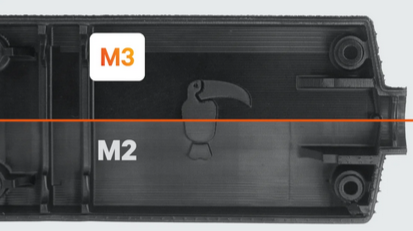 The new generation of groundbreaking 3D printers brings faster printing, larger build volume and new capabilities to the Carbon Digital Light Synthesis™ (DLS) platform.
The new generation of groundbreaking 3D printers brings faster printing, larger build volume and new capabilities to the Carbon Digital Light Synthesis™ (DLS) platform.
Carbon, a leading 3D printing technology company, announced today that it is further evolving its idea-to-production platform with all-new M-Series printers leveraging the next generation of DLS printing technology.
The next generation of Carbon printers will come in two models, the M3 and the M3 Max, providing an advanced end-to-end idea-to-production platform when combined with the Carbon Design Engine™ and Carbon DLS materials. The M3 is designed for faster printing, a simpler print experience, an expanded design space and a more consistent surface finish. The M3 Max offers these same benefits as well as a true 4K light engine, enabling double the build area with the same pixel size and density. Both printers have a wide range of high-performance materials tailored for applications across industries, including automotive, life sciences, dental, consumer products, and industrial.
“Fast Radius uses Carbon’s printers and materials to produce parts for a wide range of customers, across varying applications,” said Bobby Bott, VP of Manufacturing at Fast Radius, a Carbon Partner. “We’ve also leveraged the Carbon Design Engine—in conjunction with our own software capabilities—to help customers evaluate materials and technologies to produce parts that exceed quality standards and timelines. Having worked with Carbon for five years, we are thrilled to continue our partnership and bring the M3 capabilities to our customers.”
“With these next generation printers — combined with our Design Engine software and Carbon DLS materials — design teams across business verticals can create high-quality prototypes with end-use performance quicker and more efficiently than ever before,” said Phil DeSimone, Chief Product and Business Development Officer at Carbon. “And once the product development is complete, Carbon’s platform enables companies to move to production quickly and efficiently anywhere in the world. We believe this new generation of Carbon DLS technology will empower more collaboration and help to revolutionize how products are designed and made.”
Key features of the M3 printers include:
Simplified printer experiences: The next generation of DLS printing creates substantially lower forces on the part and introduces closed-loop control of force and temperature, reducing failure modes and simplifying the print experience.
Broader design space: Printers using the next-gen of DLS printing technology can make parts that prior generations could not, unlocking more geometries, especially for elastomeric parts, or parts with features most sensitive to high forces.
Faster printing: Thanks to better heat management, the printers deliver more throughput per square foot in thermally limited scenarios.
Smoother parts: The next-gen of DLS printing produces parts smoother than prior generations with early testing showing about a 1.4 µm reduction in surface roughness as measured by Ra.
More consistent parts: The next-gen of DLS printing reduces the variation in parts across a single-build by up to 50% — translating to less variation in general accuracy and more production repeatability in engineering resins.
Fast and easy installation: The M3 is designed to be installed in hours, with the ability to relocate the printer within their facility as customers see fit.
Larger Build Area: The M3 Max printer offers double the build area with the same pixel size and density as the M3 printer, making it ideal for larger parts or producing many smaller parts with similar quality.
The M3 printer is now available for order and shipping and the M3 Max printer is available for order and is expected to ship in the second half of 2022.
www.carbon3d.com
























































































